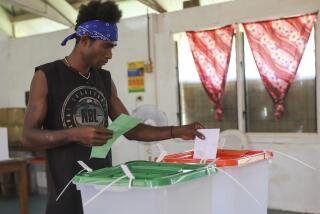Indonesia Voters Savor Moment
- Share via
REMPOA, Indonesia — A garage owner named Lisdiana was first in line, and at 8:32 a.m. Monday, with election monitors Jimmy and Rosalynn Carter looking on, she dropped her marked ballot into a locked wooden box and for the first time in her 26 years savored the taste of democracy.
“Who’d I vote for? In a democracy, that’s secret,” said Lisdiana, who like many Javanese has only one name and who voted at a polling booth set up in a soccer field south of Jakarta. “But I can tell you I feel happy. This is the first election in my lifetime, and I hope it means all Indonesians will progress together.”
All across this sprawling archipelago, from remote Irian Jaya in the east, where Lani tribesmen wearing only loincloths stood in long lines to vote, to troubled Aceh province in the west, where monitors dared not venture and sharpshooters protected the polls, Indonesians by the millions had the same message as Lisdiana: They were taking their first free election in 44 years seriously, and democracy topped their list of priorities.
At each of 300,000 polling places, before an army of half a million volunteer monitors, election supervisors began the day by passing around unlocked ballot boxes so voters could see they were empty. Then the boxes were padlocked, and voters pierced the logo of one of 48 parties listed on their ballots and dipped a finger into a well of indelible ink so they could not show up again and claim they hadn’t voted. Polls closed at 2 p.m. to prevent anything--even the tallying--from happening under the cover of darkness.
It was an extraordinary and moving scene as the world’s fourth most populous country made a final break with the 3-decade-long, repressive era of former President Suharto, who resigned in May 1998.
“How long have I waited for this?” asked Aloysius Wipowo, 29. “All my life.”
Election officials said 90% of registered voters--more than 100 million people--had voted by the time polls closed.
Final results will not be official until July, but Indonesians should have an indication this week whether the ruling Golkar party of Suharto and his handpicked successor, President B. J. Habibie, managed to cling to power or whether a coalition of opposition parties, led by Megawati Sukarnoputri, daughter of Indonesia’s founding father, the late Sukarno, wrested control.
Indonesians were not directly voting for a president Monday. Instead they were choosing, from 13,000 candidates, 462 members of parliament--335 of whom will represent Java and Sumatra, the two most populous islands in the 13,000-island nation. An additional 38 seats in the parliament are reserved for the military, an omnipotent power-broker whose members are not eligible to vote.
Those 500 legislators will then join 200 government appointees--135 provincial officials and 65 people representing special-interest groups--to form the People’s Consultative Assembly, the highest decision-making body. It will elect a president by December.
An independent election-eve poll showed Golkar with 20% of the vote and the shaky coalition of three key opposition parties with 60%. In a country in which 88% of the population of 212 million is Muslim--Indonesia is the world’s most populous Islamic nation--Megawati is considered a secular nationalist and has encountered some opposition from sectarian parties, which do not think a woman is fit to be president.
There were no early reports of election violence.
“When I was here in April, I was fearful of violence,” said former President Carter, who wore sneakers, a windbreaker and a baseball cap as he visited three outdoor polling stations in a light drizzle. “But I don’t think there’s any doubt that the elections are going to be honest, fair and peaceful. That’s going to almost immediately bring economic improvement and bring big investors back to Indonesia.”
“The greatest tragedy that could befall the nation today is to return the status quo forces to office,” the Jakarta Post editorialized Monday without endorsing a specific candidate. “Then it will be on our conscience that we have betrayed the reform movement--for failing to make meaningful changes in this country when the rare opportunity presents itself.”
More to Read
Sign up for Essential California
The most important California stories and recommendations in your inbox every morning.
You may occasionally receive promotional content from the Los Angeles Times.













